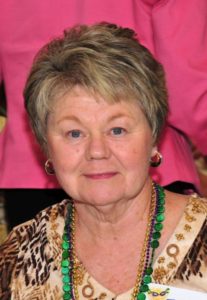By Margaret Cogswell, RN, CHPCA
CEO

Theresa Goodman, Hospice Volunteer
I’m writing today to share with you a story of someone who just last year needed hospice care (and who many of you may know).
I’d like to introduce you to Theresa Goodman, hospice volunteer extraordinaire.
Theresa came to hospice volunteering through her experience with her dad when he died at City Hospital in 1986. While hospice was a fledgling program at the time and consisted of just a few volunteers ministering to the dying in the hospital, the care that John witnessed made an impression on him. He said to Theresa, “You could do that.” Within months of his passing, Theresa completed hospice volunteer training as a way to honor her father.
Over the next 34 years, Theresa worked as an organizational support volunteer helping behind the scenes in more ways than can be counted. She volunteered every Tuesday though sometimes “Theresa Tuesday”—as it came to be known—came multiple times a week if a special project or event was happening.
She made thousands of informational folders for patients, delivered medications to patients, organized medical records and so much more. She regularly volunteered for hundreds of hours per year!
In recent years (even after beating a rare form of cancer twice that resulted in her losing her left eye), she could be found at the Hospice office at 10:00 the night before our Light Up A Life ceremony helping to check off each name that was to be put on a luminary to be sure no one had been missed. Then she’d be back early the next morning bundled in hat and gloves to help set out the luminaries.
At the beginning of March last year—just as the COVID pandemic was setting in—Ashley Horst, our staff member with whom Theresa worked most often received a phone call from Theresa. Theresa told her that she’d had been diagnosed with pulmonary fibrosis—a lung disease that causes the lung tissue to become thick and stiff making it very difficult to breathe.
This just didn’t make sense to those of us who knew and loved Theresa. We care for people all of the time with serious lung disease and Theresa hadn’t shown the symptoms that we would expect from someone with an advanced lung illness.
